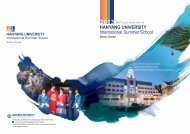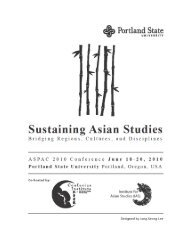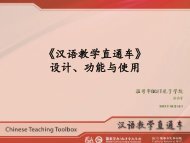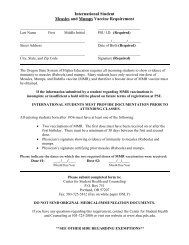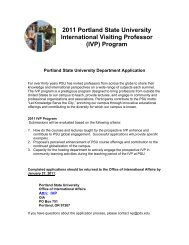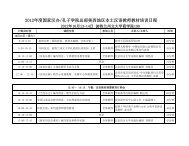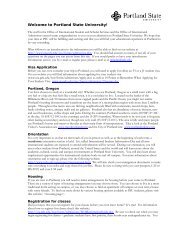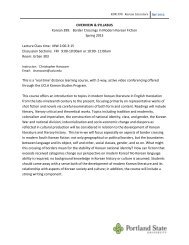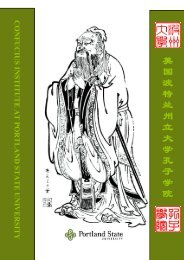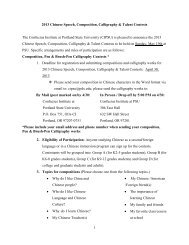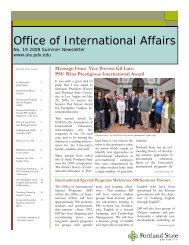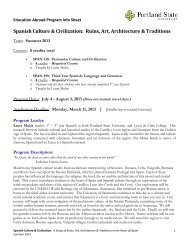ABSTRACTS - oia - Portland State University
ABSTRACTS - oia - Portland State University
ABSTRACTS - oia - Portland State University
Create successful ePaper yourself
Turn your PDF publications into a flip-book with our unique Google optimized e-Paper software.
ASPAC Conference 2010<br />
June 18 – 20, 2010 | <strong>Portland</strong>, OR<br />
Nicole Nowlin<br />
Scanlations: Copyright Infringement for Literature and Art Fans Brought to You by the Internet<br />
In the US, Japanese film, anime, manga, food, fashion, cars, and music have a growing impact in pop culture.<br />
Now, with the addition of the internet to the equation, scanlations come into play. The paper is an<br />
examination of the pop culture phenomenon of Japanese manga comics in the United <strong>State</strong>s and the world of<br />
illegal scanlations. Scanlating is the practice of scanning and translating Japanese manga from its native<br />
language into English. Scanlations, especially when viewed as a parallel to the current lawsuits for illegal<br />
music downloading, is inherently an unacceptable practice from a legal standpoint, yet is widely accepted and<br />
used in the anime/manga subculture in the United <strong>State</strong>s. Explanations and analysis will be drawn from US<br />
Copyright laws, interviews conducted with publishers, authors, and fans, and a survey of user demographics.<br />
The paper concludes with a look at the likelihood of the trend changing in the near future, and the overall<br />
theme behind the movement to continue scanlations.<br />
~ ~ ~ ~ ~ ~ ~ ~ ~ ~<br />
Takeshi Odaira<br />
Regional Environmental Cooperation in East Asia: From Track 1 ODA to Track 1.5 Business Arrangement<br />
Now the concept of East Asian Community is discussed in both the political and academic realms much more<br />
often than the past. Besides, the need of international environmental cooperation is claimed in the same<br />
realms. Therefore, it is meaningful to produce a paper on the study of regional environmental cooperation in<br />
East Asia, as global frameworks of the environmental cooperation such as UNFCCC have not developed to<br />
universally effective means of protecting the environment. This logic is equivalent to that of FTA researchers<br />
and policy makers who tend to deal more with regional economic arrangements when the development of<br />
universal trade arrangements such as negotiations at WTO are much less prospective in its speed of progress.<br />
How does the regional environmental cooperation develop in East Asia? To this research question, a few<br />
researchers have given their answers. Matsuoka, Matsumoto and Iwamoto (2008) assumed that the track 1<br />
official environmental cooperation leads to the track 1.5 cooperation as a part of the first stage of the<br />
development of the regional environmental regime. However, they did not examine how this process in the<br />
first stage proceeds in East Asia. Therefore, it is necessary for the following researchers to conduct case<br />
studies to examine the relevance of the aforementioned assumption. The proposed paper conducts a<br />
qualitative case analysis on verifiable official documents and press releases. This analysis illustrates that<br />
bilateral track 1 de jure environmental cooperation such as ODA is leading to the emergence of track 1.5 de<br />
facto cooperation involving the corporate sector in East Asia.<br />
~ ~ ~ ~ ~ ~ ~ ~ ~ ~<br />
Sujin Oh<br />
Hazu da and Wake da as Logical Conclusion<br />
Hazu da and wake da are contemporary Japanese terms expressing the perceptions of a speaker as a logical<br />
conclusion. Hazu da refers to coming to a conclusion inevitably via the laws of nature or certain<br />
circumstances. It is also used when judging that the current circumstances can be the natural consequence<br />
based on your understanding of a certain fact about which you have doubted. This is an expression to let<br />
others know the circumstances from which your inferences are made are true based on your current<br />
knowledge while you may not be able to speak positively when you want to judge whether they are true or<br />
not. Wake da refers to coming to a conclusion inevitable such as a certain fact, circumstance, or<br />
reasonableness. Like hazu da, it is used when the current circumstances are natural consequences based on<br />
your understanding of the truth of a fact while you may still have doubts about it. It is the expression of a<br />
speaker to listeners indicating that it is a natural consequence of a certain thing. The expression shows that we<br />
reach a natural consequence through inferences from obvious facts in order to explain why a certain fact is as<br />
it is. As for the difference between the two, wake da is an expression used to make a decision by presenting<br />
29



